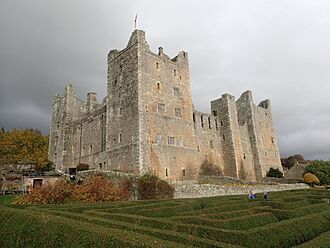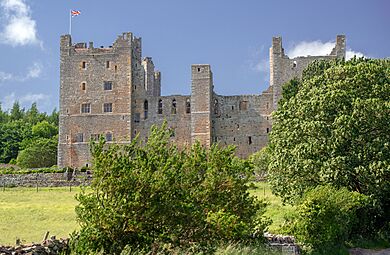Bolton Castle facts for kids
Quick facts for kids Bolton Castle |
|
|---|---|

The castle from the south
|
|
| General information | |
| Location | Castle Bolton, Yorkshire, England |
| Coordinates | 54°19′19″N 1°56′53″W / 54.321932°N 1.948106°W |
| Construction started | 1378 |
| Completed | 1399 |
| Client | Richard, Lord Scrope of Bolton |
| Owner | Thomas, Lord Bolton |
| Design and construction | |
| Architect | John Lewyn |
|
Listed Building – Grade I
|
|
| Designated | 13 February 1967 |
| Reference no. | 1130885 |
Bolton Castle is a magnificent 14th-century castle in Wensleydale, a beautiful valley in Yorkshire, England. The nearby village, Castle Bolton, is named after this impressive stone fortress.
The castle is so important to England's history that it is protected as a Grade I listed building and a Scheduled Ancient Monument. Although it was damaged during the English Civil War hundreds of years ago, much of the castle still stands today. Amazingly, it has never been sold and is still owned by the descendants of the family who built it, the Scrope family.
Contents
Building a Fortress
The castle was built between 1378 and 1399 by a powerful nobleman named Richard, 1st Baron Scrope of Bolton. It is a perfect example of a quadrangular castle, which means it was built in a square shape with a central courtyard.
Lord Scrope got permission to build the castle in 1379. He hired a master mason named John Lewyn to lead the construction. It was a huge and expensive project, costing 18,000 Marks, a fortune at the time.
The castle was famous for its clever design. A writer in the 16th century, John Leland, described a special 'Astronomical Clock' in the courtyard. He also wrote about how smoke from the main hall's fireplace was cleverly channelled away through tunnels in the walls.
A Royal Prisoner: Mary, Queen of Scots
One of the most famous chapters in the castle's history involves Mary, Queen of Scots. She was held as a prisoner at Bolton Castle for six months.
After losing the Battle of Langside in Scotland in 1568, Mary fled to England. This worried England's Protestant queen, Queen Elizabeth I, because Mary was Catholic and had a claim to the English throne. Mary was first kept at Carlisle Castle but was moved to Bolton in July 1568 because it was more secure.
Life in Captivity
At Bolton, Mary was looked after by Sir Francis Knollys. He was impressed by the castle, calling it "very strong, very fayre, and very stately" and noting it had the highest walls he had ever seen.
Mary stayed in the private rooms of the castle's owner, Lord Scrope, located in the South-West tower. She had a large group of followers, but only 36 of them could stay inside the castle with her. Her team included cooks, a hairdresser named Mary Seton, an embroiderer, and doctors.
The castle wasn't ready for a queen, so furniture, rugs, and tapestries were borrowed from nearby homes and Barnard Castle. Queen Elizabeth I even sent some pewter dishes and a copper kettle. Mary made her room feel more like a throne room by placing a special cloth, called a "cloth of estate," above her chair.
While she was a prisoner, Mary was allowed to walk in the countryside and go hunting. She spent much of her time having her hair styled by her friend, Mary Seton. Sir Francis Knollys, whom she called her 'Schoolmaster', taught her to speak and write in English. In January 1569, Mary was moved from Bolton to Tutbury, where she spent most of the next 18 years before her execution.
Later History and Today
In 1630, the castle passed to Mary, the eldest illegitimate daughter of Emanuel Scrope, 1st Earl of Sunderland. She married Charles Powlett, and the castle has remained in their family line ever since.
Today, Bolton Castle is owned by their descendant, Thomas Peter Algar Orde-Powlett, 9th Baron Bolton.
Visiting the Castle
Bolton Castle is now a popular tourist attraction. While part of the castle is a ruin, other sections have been restored so visitors can see what it was like centuries ago.
The grounds feature beautiful gardens, including a maze, a herb garden, and even a vineyard. On certain days, visitors can watch exciting falconry displays, where trained birds of prey show off their flying skills. The castle is also a unique venue for special events like weddings.
Bolton Castle on Screen
Because of its authentic and dramatic appearance, the castle has been used as a filming location for many movies and TV shows. Some of these include:
- Ivanhoe (1952)
- Elizabeth (1998)
- Bill (2015)
- The TV series Heartbeat
- The TV series All Creatures Great and Small
See also
 In Spanish: Castillo de Bolton para niños
In Spanish: Castillo de Bolton para niños
- Castles in Great Britain and Ireland
- List of castles in England
- Grade I listed buildings in North Yorkshire (district)
- Listed buildings in Castle Bolton with East and West Bolton
 | May Edward Chinn |
 | Rebecca Cole |
 | Alexa Canady |
 | Dorothy Lavinia Brown |


